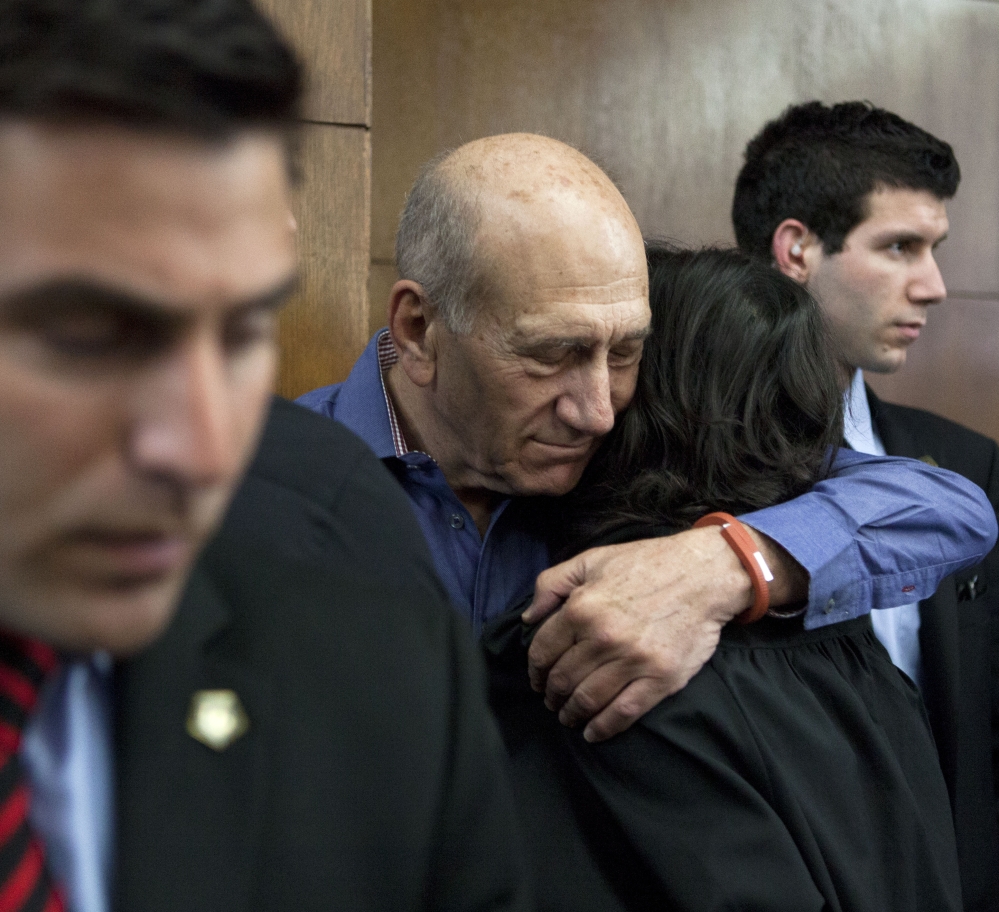JERUSALEM — An Israeli court on Monday convicted ex-Prime Minister Ehud Olmert in a high-profile bribery case, crushing his hopes for a political comeback and setting the stage for him to become the first Israeli premier to go to prison.
The verdict capped a four-decade political career that saw Olmert transform himself from a sharp-tongued backbencher into a global statesman whose push for peace with the Palestinians was cut short by his legal troubles.
“It’s a sad day for my country,” President Shimon Peres, a Nobel peace laureate, said during an official visit to Austria.
Olmert was among 13 government officials, developers and businesspeople charged in three separate schemes related to a housing development in Jerusalem. The Israeli media described the case as the largest corruption scandal ever exposed in Israel.
According to the original 2012 indictment, millions of dollars illegally changed hands to promote a series of real estate projects, including the “Holyland” housing development, which required a radical change in zoning laws and earned the developers tax breaks and other benefits. The hilltop development, resembling a large fortress, is a frequent target of criticism because of its hulking appearance.
Olmert was charged for acts committed while he was mayor of Jerusalem and minister of industry and trade, years before he became prime minister. He was accused of taking bribes to push the project forward.
Olmert rejected all allegations of wrongdoing, and tried to portray a key witness, the late businessman Shmuel Dechner, as unreliable.
But in a stinging rebuke, Judge David Rozen dismissed Olmert’s version. He “tried to get the court to tarnish (the name) of the state witness, at the price of telling lies in his testimony in court,” Rozen wrote in his decision.
Olmert’s aides said an appeal was likely. “We will study the case closely, and this is probably not the end,” said Amir Dan, an Olmert confidant.
Sentencing is set for April 28. Legal experts said the conviction would almost certainly entail prison time — all but ending a long political career that has repeatedly been dogged by corruption allegations that, until Monday, had rarely stuck.
Olmert, 68, faces up to seven years in prison. And under Israeli law, he would have to wait at least seven more years after serving his sentence to run for office.
Even if he somehow wins an appeal, he has become so tainted that a comeback is virtually impossible, said Tamir Sheafer, a professor of political science at Jerusalem’s Hebrew University.
“The ruling is so damaging politically that even if he is somehow exonerated, his career is over,” he said. “He had to come out as pure as snow to carry on.”
Olmert has already faced a trial on separate charges of accepting illicit funds from an American supporter and double-billing Jewish groups for trips abroad. He was cleared in 2012 of the most serious charges but convicted on a lesser count of breach of trust for steering jobs and contracts to clients of business partners and got a suspended one-year sentence.
That verdict was seen as a moral victory, and Olmert had signaled an intention to return to politics after the Holyland case was resolved. Olmert had been seen as one of the few politicians capable of mounting a challenge as a centrist alternative to Prime Minister Benjamin Netanyahu.
Olmert, a longtime fixture in Israel’s hard-line right wing, began to take a more moderate line toward the Palestinians a decade ago when he was deputy prime minister and was a leading figure in Israel’s withdrawal from the Gaza Strip in 2005.
He became prime minister in January 2006 after then-Prime Minister Ariel Sharon suffered a debilitating stroke. He subsequently led their newly formed Kadima Party to victory in parliamentary elections on a platform of pushing further peace moves with the Palestinians.
A gifted orator, Olmert crossed a series of taboos while in office — warning that Israel could become like apartheid South Africa if it continued its occupation of the Palestinians and expressing readiness to relinquish control of parts of the holy city of Jerusalem as part of a peace deal.
Olmert led his government to the Annapolis peace conference in November 2007 — launching more than a year of ambitious, but unsuccessful peace talks with the Palestinians.
Despite his ambitious agenda, Olmert’s term was clouded by the kidnapping of an Israeli soldier who was captured by Gaza militants in a cross-border raid and an inconclusive war against Hezbollah guerrillas in Lebanon. Both incidents occurred shortly after he took office.
Olmert also launched a military invasion of the Gaza Strip in late 2008 that drew heavy international criticism.
If he goes to prison, Olmert would join former President Moshe Katsav, who is serving time for a rape conviction, as the most senior politicians to land behind bars. Prosecutors have hailed the cases as evidence that no one is above the law.
“Every bribe giver and every bribe taker will now forever know that they are not immune,” prosecutor Yonatan Tadmor said after the verdict.
Send questions/comments to the editors.



Comments are no longer available on this story